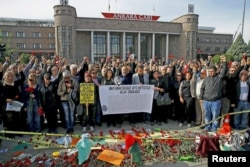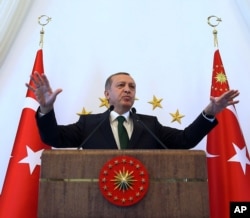U.S. and European leaders are paying close attention to Sunday’s snap elections in Turkey as tensions rise ahead of the poll in which Turkish President Recep Tayyip Erdogan's AKP Party seeks to regain a majority it lost in June elections.
For decades, Turkey has been a stable and reliable partner for the U.S. and Europe, hosting NATO bases and serving as a bridge between the Middle East and the West.
The bombing of a peace rally in Ankara, a Kurdish insurgency, and continuing clashes between police and suspected Islamic State militants are raising concerns about Turkey’s future as a strategic ally in the region.
For such a contentious parliamentary election, the campaigning has been low-key. Campaign workers with the Kurdish-dominated HDP, reviled by Erdogan supporters, are limiting themselves to reaching out individually to voters.
The October 10 explosions in Ankara forced caution.
"Of course, after the Ankara explosions, our party [heads] met, discussed the explosions and cancelled the big meetings to keep people safe," said Suat Corlu, an official with the HDP's Istanbul campaign.
Post poll violence?
Security is a major issue in these elections, at a time when Turkey is once again fighting a Kurdish insurgency led by the Kurdish Workers Party, the PKK, and Islamic State militants, who the government blames for the October 10 attacks.
Turkish police this week raided what they said were Islamic State cells in Diyarbakir, in Turkey’s southeastern Kurdish region.
"Recently, the terror organizations are more dangerous for Turkey than ever," said Veysel Kurt, a political analyst at the Foundation for Political, Economic and Social Research, an Istanbul research organization. "... Firstly, PKK is a terror organization threat Turkey over 30 years and secondly a new phenomenon of the Middle East, ISIS, actually is another threat for Turkey."
Turkey’s government makes no distinction between Kurdish rebels and Islamic State militants. It regards members of both groups as terrorists.
That makes some Kurdish activists feel vulnerable. They say they are bracing for possible violence after Sunday’s poll.
"During the elections, I think the violence and attacks will continue," said Berfin Azdal, a Kurdish woman handing out leaflets for the HDP on Istanbul’s busy Istiklal Street. "After the elections in this country, just as Erdogan did not respect the choices of the people, he may not show respect after these elections, too," she said.
Failing to regain a majority in parliament would allow the Kurdish-dominated HDP to gain influence and, in a nightmare scenario for Turkey’s government, put the country on track toward Kurdish autonomy, ushering in a new era of instability.
No clear majority
Snap elections are taking place after parliamentary elections in June were inconclusive and talks to form a coalition government failed. Erdogan's party, AKP, won 258 seats, 18 short of the 276 needed for a majority in the Grand National Assembly, Turkey’s parliament.
The last opinion polls conducted before the elections indicated no party has a clear majority, raising the possibility of a coalition government.
That prospect does not sit well with Erdogan’s supporters.
"The AKP is the guarantee of this country’s future. It should be in power by itself, alone," said Omer Guler, an AKP supporter standing outside a campaign office in Istanbul. "If they come together for a coalition, it will not work."
Turkey at a glance
Turkey at a glance
- Gained independence on October 29, 1923, ruled by a Republican Parliamentary democracy
- Turkey has 15 active political parties. The main ones include the Justice and Development Party (AKP); Republicans People's Party (CHP); Nationalist Movement Party (MHP); and the People's Democracy Party (HDP).
- Joined the United Nations in 1945 and NATO in 1952
- Turkey has a population of 79,414,269 making it the 19th most populous country in the world.
- 73 percent of its population lives in urban areas.
- 99 percent of Turkish citizens are Sunni Muslim
- Has a GDP of $1.508 trillion
- Located in both Southeastern Europe and Southwestern Asia
- Shares a border with eight countries: Bulgaria, Georgia, Armenia, Azerbaijan, Greece, Iran, Iraq, Syria
Analyst Kurt agrees, saying a coalition government may not be as effective in countering Turkey’s current security challenges. He pointed to the 1980s and '90s, when Turkey was governed by coalitions.
"If we look at these periods, we see that the PKK was very active," Kurt said. "When you look at Turkish history, we see that the coalition is a very, weak formulation. Yes, it is legally accepted formulation but politically very weak government."
The AKP’s opponents say Erdogan has used that argument in his efforts to retain and consolidate power. They are wary of fraud or attempts to manipulate Sunday’s vote.
Monitoring the election
More than 55,000 election monitors will be in position on Sunday.
U.S. and European leaders are watching events as well. On a visit to Ankara last week, Assistant Secretary of State Victoria Nuland expressed appreciation for Turkey’s airstrikes against Islamic State rebels and underscored U.S. solidarity in the face of the security threats facing Turkey.
A statement said Nuland also discussed "the importance to Turkey’s democracy of the upcoming November 1 parliamentary elections."
This week, U.S. State Department spokesman John Kirby had a warning for Turkey’s leaders following a spate of police attacks on members of the media, including Wednesday’s police raid on a media company in Istanbul that authorities say has ties to a movement that it considers a terrorist organization. The company, Koza-Ipek, owns television stations and newspapers that have been critical of the Erdogan government.
"We continue to urge Turkish authorities to respect not just media freedom but the political process, which includes a vocal opposition," Kirby said.







